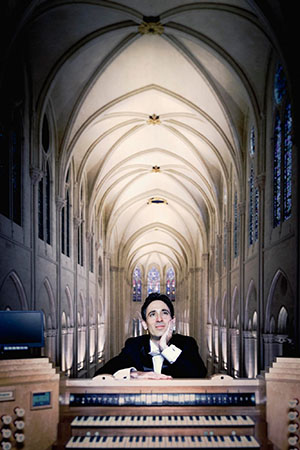by Daniel Hathaway

Three years later, on April 15, the disastrous fire broke out in the roof of the 12th century building that miraculously spared the cathedral’s organ, but closed the structure for five years. That exiled Dubois and his colleagues from church and organ until a festive re-opening last December.
Dubois will return to Cleveland to play a solo recital on Tuesday, March 18 at 7:30. Ironically, the recitalist will be exiled this time from the Cathedral of St. John the Evangelist — but not by fire.
In an email blast, director of music Thomas Fielding wrote, “Our Cathedral Holtkamp organ is unreliable at this point and slated for major renovation work starting right after Easter. This concert will be held, instead, at Trinity Episcopal Cathedral.”
Dubois said that he will play the same program at Trinity as he planned for St. John’s, including J.S. Bach’s Prelude and Fugue in a minor, the first movement of Charles-Marie Widor’s Sinfonie No. 5, Maurice Duruflé’s Prélude et Fugue sur le nom d’Alain, and Louis Vierne’s Carillon de Westminster, dedicated to the British organ builder Henry Willis III and based on the quarter-hourly chimes from the tower of the Houses of Parliament. He’ll end his program with a French tradition — an improvisation on themes submitted by the presenters.
That traditional improvisation reveals an important national difference between organists. The French only play written literature at the end of masses and in recital. The rest of their music-making is timed to coincide with liturgical actions of varying length.
Improvisations in recital are popular with audiences and fun both for players and the submitters of themes. “I’ve been asked to improvise a symphonic movement on the Nokia theme,” Dubois said. And there are stories about unwitting European organists being given themes they don’t recognize that turn out to be football fight songs — to the delight of listeners.
Dubois may have been exiled from Notre-Dame during the restoration, but he remained busy. In a recent phone conversation, he told me that services were moved to Saint-Germain-l’Auxerrois, the large Gothic church across from the Louvre Museum, where the cycle of daily services remained intact.
Every third week, Dubois played for all the daily services that keep French cathedrals humming, and these duties expanded on weekends.
“I also kept up my activities as a concert organist and teaching at the Musikhochschule in Saarbrücke,” he said, noting that traveling back and forth has become much more efficient since TGVs (Trains de Grand Vitesse) have entered the French rail network.
With the reopening of Notre-Dame, the team of titular organists has been expanded to four: Latry and Dubois are now joined by organist, composer, and improviser Thierry Escaich, a major figure in contemporary French music, and Thibault Fajoles, who at 21, represents “the very young generation of French organists.”
Dubois noted that the Grand Orgue of Notre-Dame remains exactly as it was before the fire, but the instrument was dismantled for a thorough cleaning. What has changed to his ears is the acoustic of the nave.
“The whole interior of the building is brighter now,” Dubois said, “and the acoustic seems brighter as well, although that might be the eyes influencing the ears.”
Vincent Dubois’ recital at Trinity Cathedral on March 18 at 7:30, is part of the Helen D. Schubert Concerts at St. John’s Cathedral. Admission is free. A voluntary offering will be received.
Published on ClevelandClassical.com March 17, 2025



